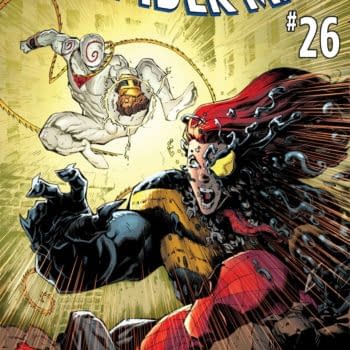Posted in: Comics, Vintage Paper | Tagged: pulps, spicy history stories
How the Clayton/Mencken Rivalry Helped Create the Spicy Pulp Market
Spicy History Stories #2: How a reportedly vicious competition between William M. Clayton and Warner Publications blew up the spicy magazine market.
In the book A Requiem for Astounding, the title's first editor Harry Bates describes having to convince publisher William M. Clayton to launch something besides the historical fiction title called Torchlights of History that Clayton had wanted: "I had had much experience of shocks in that office, and upon collecting my wits I at once began vigorously to defend myself, making a strong case for not publishing a period magazine and concentrating on the objection that it would be next to impossible for the editor to get enough good or even so-so stories for it. (By reflex, like the duck of a boxer, I spoke as if someone else was to be stuck with the magazine.) Clayton heard me and pleasantly but like a steam roller suggested that I spend an hour or so thinking it over. In a rearguard action I attacked the awful name, at which he naturally suggested that I find a better. All this time the controller said nothing; just looked at me in the manner of a benign bestower of something valuable, free. I saw that Clayton was not to be stopped from having another magazine, and I left his office dismayed and a little angry."
The "better name" was Astounding Stories of Super-Science, a title that Clayton apparently liked enough to overlook the fact that the period of history it focused on was the future. Bates, whose 1940 Astounding short Farewell to the Master inspired iconic science fiction film The Day the Earth Stood Still, was not the only legendary pulp figure with whom Clayton would clash.
Author, journalist, and social critic H.L. Mencken, perhaps best remembered in pulp history for his role in co-founding and editing Black Mask, had earlier run-ins with Clayton as a competitor. Mencken had been a contributor to the fiction magazine Smart Set beginning in 1908, while Clayton was on staff in various business roles there. Clayton's father, William d'Alton Mann, founded and published the magazine as a sort of fictional companion to his notorious gossip paper Town Topics. After Smart Set's 1911 sale by Clayton's father to John Adams Thayer, Clayton promptly started a more risque competitor in Snappy Stories with his father's backing in 1912. Smart Set was then acquired from Thayer by Eltinge F. Warner's Warner Publications. Mencken and George Jean Nathan edited Smart Set 1914-1923 and also helped escalate this nascent spicy magazine war, initially by launching Parisienne into this same market space in 1915.

Welcome to Spicy History Stories #2, the second installment of a weekly column about pulp magazine history that we're launching to coincide with the debut of Heritage Auction's weekly pulp magazine auctions. Unlike other auction-centric posts we've done here, this column is not necessarily designed to be closely tied to any particular items up for auction. Mostly, it's this: if you enjoy the nerdy details of comic book history, you're going to love the astounding (and yes, sometimes weird) history of the people and companies that made the pulps.
In his autobiography My Life as Author and Editor, Mencken describes how the launch of Parisienne ignited an already tense rivalry: "Unhappily, it also aroused the baser passions of old Colonel Mann's bastard son, Clayton, whose nefarious imitation of the Smart Set, Snappy Stories by name, now had a new and apparently formidable competitor [in Parisienne]. Clayton, a scoundrel if there ever was one, sought revenge by a characteristic device. That is, he had one of his agents complain to the New York Society for the Prevention of Vice that the Parisienne was obscene. This was either late in August or early in September, 1915." This resulted in the arrest of Eltinge F. Warner. According to Mencken, Warner's lawyer facilitated a $500 bribe to a judge, which ended the matter.
Mencken also claims that Warner's anger over this matter drove him to plot revenge against Clayton, as he developed schemes to induce the Society for the Prevention of Vice to go after Clayton's Snappy Stories as well. For his part, Mencken's idea of retaliation was to escalate the competition by launching another entrant in this space in 1916, Saucy Stories: "Nathan and I were naturally against Warner's plan to have him raided, for we feared that if it were executed it might only bring down the Comstocks upon the Smart Set. But it was plain that something would have to be done to teach him a lesson, and during the spring of 1916 we hit upon a plan. It was to bring out a new pulp magazine that should do to Snappy Stories what Snappy Stories was doing to the Smart Set."
Absent more evidence, it is unclear whether Mencken's suspicion that Clayton was behind the original raid over Parisienne was what actually happened. Or for that matter, if Eltinge Warner actually set his eye-for-an-eye scheme of revenge against Clayton in motion. Nevertheless, in March 1916, Clayton, along with two staffers, were arrested and charged with publishing and offering for sale obscene literature in Snappy Stories. Around the same time, a Street & Smith editor or staffer named George C. Dodge was also arraigned on a charge of publishing indecent literature in Live Stories. Both of those cases were eventually dismissed.
Undaunted, Clayton quickly acquired Live Stories from Street & Smith. In 1916-1917, both Clayton and Warner would double down on this market segment by offering rebound titles of previous material. Warner Publications issued rebinds of Saucy Stories and Parisienne titled Clever Stories and Fascinating Fiction, respectively, while Clayton's New Fiction Publishing Co. rebinds included Spice Box, Pepper Pot, and Ginger Jar. Of course, other publishers had entered the fray by this time, and C.H. Young Publishing Company published rebound copies of Young's Magazine that year (under the Yellow Book name), which is arguably the title that started this market in 1897. Meanwhile, Snappy Stories continued to cause controversy.
Other rivals had also quickly emerged. As early as 1913, 10 Story Book (then newly acquired by publisher Arthur J. Gontier) began to react to the market evolution triggered by the emergence of Snappy Stories with a shift towards more suggestive covers and by 1914 included the cover tagline No Essays, No Serials, Nothing Heavy, Just 10 Snappy Stories. Of course, the spicy pulp market would ramp up substantially over the 1920s and 1930s, with titles ranging from Pep Stories to Spicy Mystery and a legion of others.















